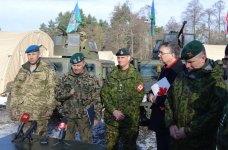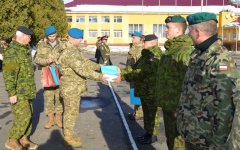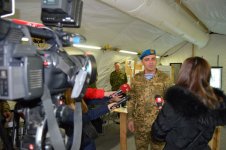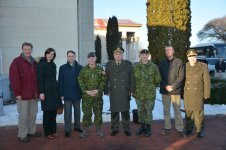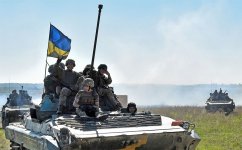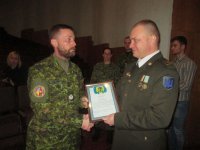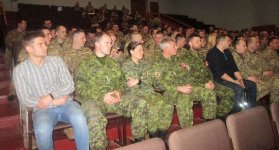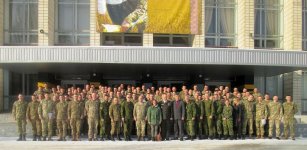- Reaction score
- 4,175
- Points
- 1,260
From the UKR Info-machine (Google Translate version quoted, original in Ukrainian here) - highlights mine:
Photos from the Info-machine attached.In Lviv completed international military exercises "Maple Arch 2016"
Today, on November 18 in Lviv, at the International Peacekeeping and Security Centre completed a multinational command post exercise "Maple Arch 2016". Maneuvers, which lasted about two weeks, took place under the mentoring of Canadian instructors with the participation of the Armed Forces of Ukraine, Lithuania and Poland.
Ukraine was represented on training soldiers landing-assault battalion 80 th separate Landing and Assault Brigade Airborne Forces of Ukraine, part of the dowry departments Lithuanian-Polish-Ukrainian brigade. According to the Principal Investigator exercises on the Ukrainian side Skybyuka colonel Igor, Ukrainian paratroopers, the whole process of planning and decision making was by the Euro-Atlantic processes.
- It is important to note that the staff structure landing-assault battalion was adapted according to the structure of NATO. The area where the events unfolded command and staff training - specific region of the state. This was done to ensure that our troops have the opportunity to "attached" to the ground and could more realistic and detailed work - said Lt. Col. Igor Skybyuk.
During the exercise, bringing together more than two hundred armiytsiv the four countries was coordinated and synchronized procedures to ensure order and further tasks dowry to the multinational brigade Ukrainian, Polish and Lithuanian battalions. Also, soldiers improved their practical skills during stabilization and peacekeeping operations.
As the co-education of Canadian Lieutenant Colonel John Woodgate, scenario of military maneuvers developed by the Canadian military experts, was dynamic, realistic and challenging.
- During the exercises were created opportunities for soldiers from different countries to collaborate, learn and share experiences. Scenario studies meet the threats and challenges that are most typical for modern armed conflicts worldwide. We are satisfied with the results that had been achieved by all participants of training - said Lieutenant Colonel John Woodgate.
In celebration of the completion of the international military exercises came the military high-ranking individuals from participating countries, including the commander of land forces of Lithuania Brigadier General Valdemaras Rupshis, commander LYTPOLUKRBRYH Colonel of the Armed Forces of Poland Zenon Bzhushko, commander of the 5th Division of the Armed Forces of Canada Brigadier General Charles Tyuren and commander 80 th separate landing and assault brigade Airborne Forces of Ukraine, Colonel Vladimir Shvorak.
The guests visited the command post deployed Lithuanian-Polish-Ukrainian brigade, who performs under the direction of Deputy Commander Colonel Vladimir LYTPOLUKRBRYH Yudanov. They also attended the briefing, the commander of the landing-assault battalion, Major Oleg Balyasa, inspected the work of other sections and departments involved and responsible for organizing and conducting training, talked to the participants of the "Maple Arch 2016".
During the closing ceremony of multinational military exercises best were awarded memorable.


